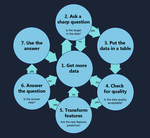Resources for Learning R
The entry point for most of us into analytics is our experience with Microsoft Excel. At some point though, projects and organizations require more. The breakdowns are typically:
We need to separate the data from the analysis, with storage, for a single source of truth.
We need to be able to automate the analysis.
We need the analysis to be reproducible.
We should not pay a third party obscene amounts of money for something as basic as arithmetic.
The Palmer Penguins
This week’s #TidyTuesday subject is a study of 342 observations of Antarctic penguins on the Palmer Archipelago.
Our goal here is first to predict the sex feature missing from several of the penguins in the dataset using a classification model, driven by what is known in other observations in the dataset.
Then, we will take a closer look at an expert data visualization crafted by Cedric Scherer.
And finally, we will close with a discussion of several methods of assessing variable importance.
Chicago R Collaborative 2020
This weekend was my first ever Open Source R hackathon. This post covers my observations about what we set out to do, who I met, what I learned, and what we accomplished.
What we set out to do The Chicago R Collaborative is an annual activity funded with an R Consortium grant that supports community-led, locally-organized R development events around the world.
The challenge this weekend was to team up with other R users to contribute to open source packages, work on data tools, pursue projects we wish we had time for in our day-to-day work, and learn from others in our local R community.
The Value of a Business Analytics Capstone Project
It’s fashionable for business leaders today to tout their sophisticated data science initiatives. Yet the path between identifying business problems and realizing the business value is not often clear.
A reality for many enterprises is that they have:
diverse individual customers, globally, with growing brand expectations.
ever more complex customer offerings - each with quality, lead time, conversion rate and dozens of other success metrics.
growing complexity in managing the ethical and regulatory aspects of their digital offering.
Working as an Analytics Team
The sheer volume of data available today presents real challenges for businesses and opportunities for those who can analyze and explain it. The department leading the charge must enable and empower the rest of the organization with solutions to make better, data-driven decisions. Kim Larsen writes, “Fire Your BI Team” in a recent appeal to shift the mandate and engagement model.
Whether this group call themselves Analytics or Operations Research or Data Science, who are these people, and what are their roles in the organization?
AI and Data Strategy
Artificial Intelligence is a hot topic, even outside of tech companies.
Against this backdrop, Dr. Hugo Bowne-Anderson hosts episode 1 of what promises to become a monthly series of webcasts titled: How AI Can Improve Your Data Strategy for DataCamp, the on-line Python, SQL, and R coding school. They appear to be pivoting their focus towards business enterprises, from individual students and universities.
Indeed, employees in many business roles today need a degree of competence in the emerging fields of Data Science, Machine Learning, and Artificial Intelligence to understand when to use the tools, when not to use them, and how to talk the talk with data professionals.
End-to-End Machine Learning
Brandon Rohrer of iRobot curates a “Teachable” collection of courses/blogs called End-to-End Machine Learning which include a number of free introductory sections, including:
Data Science Concepts, is a pocket guide to building the things that data scientists build. It opens with a 49 minute video, Data Science for Absolutely Everyone from his days building these materials in 2016 with Microsoft. As amazing as it is, there are only five questions that machine learning can answer:






